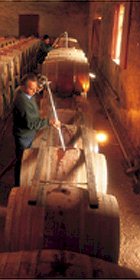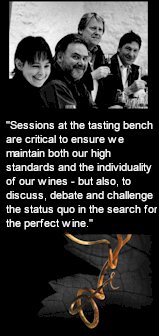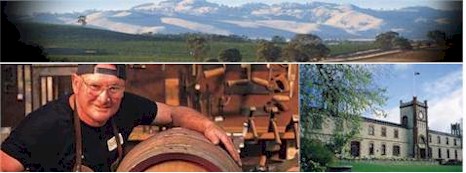


Yalumba was founded in 1849 by Samuel Smith, British migrant and English brewer, who had brought his family to Angaston seeking a new life. After purchasing a 30-acre parcel of land just beyond the southern-eastern boundary of Angaston, Smith and his son began planting the first vines by moonlight. Samuel named his patch Yalumba, aboriginal for 'all the land around'.

The Yalumba philosophy quietly encourages innovation, experimentation and a visionary outlook in the quest to make great wine. There are literally thousands of rare, eclectic and idiosyncratic grape varieties used to make wine around the world. Yalumba's Vine Propagation Nursery is able to source many of these varieties, performing clonal and varietal selection, which ultimately provides small batches of fruit for Yalumba's Vinnovations label. In order to sustain the formulation of some of Australia's most compelling wines, Yalumba implements an environmental improvement programme that reflects credible environmental stewardship and due diligence.
At Yalumba, no aspect of winegrowing or winemaking is left to chance. For the past 30 years, Yalumba has been able to influence grape quality at its earliest stage. In the 1970s, the winery made a far-sighted decision to establish its own vine nursery. Today the Yalumba Vine Nursery is one of Australia's largest viticultural nurseries, supplying high quality vines to winemakers throughout Australia. Not only does the Nursery provide safe, quality rootstock for established varieties such as Cabernet Sauvignon and Shiraz, it is also a leading supplier of specialised clones such as the Burgundian Pinot Noir and Chardonnay clones in heavy demand by the country's leading winemakers.
In a wine market largely obsessed with single-varietal wines, Yalumba has remained steadfast in its commitment to that most Australian of wine styles, the Cabernet Shiraz blend. Cabernet Shiraz is taken so seriously by Yalumba, that Brian Walsh, Yalumba's Director of Winemaking persuaded the committee of the Adelaide Wine Show to introduce a separate judging class for the style. It's a wine style that is unique to Australia, he says, and plays such an important part in Australia's winemaking history.

As a wine business operating in the rural environment for over 150 years, Yalumba recognises the impact of its activities on its natural surrounds. Yalumba is committed to integrating best environmental practice into its everyday activities to ensure long-term sustainability. In 1999, Yalumba became the first Australian winery to sign up for the Greenhouse Challenge - an initiative dedicated to reducing greenhouse gas emissions. Yalumba's aim is to be recognised as Australia's finest independent wine company. A wine produced by means of environmentally-friendly sustainable processes is increasingly being recognised as being an intrinsic aspect of quality.
The crafting of oak barrels is a proud tradition at Yalumba with a coopering history dating back to the turn of the 20th century. With its own on-site cooperage, Yalumba is the only winery in Australia, and one of a small and select group of wineries in the world, to enjoy this privilege. Oak plays an important part in the winemaking process and Yalumba have the advantage of being able to have full control of the quality of oak used to age their wines. Yalumba imports oak staves from the world's best oak forests in France and America, and then air-dries the oak for many Barossan summers and winters to leach any sappy, bitter characters from the wood. This extended seasoning (as opposed to the more common practice of seasoning the oak for between 18 months and 2 years) imparts rich chocolate mocha characters and adds yet another layer of texture to the wine without masking the fruit flavours.
"Yalumba is one of the most beautiful wineries in Australia. With magnificent buildings and beautifully manicured gardens and lawns, this is a place to savour. Established in 1849, Yalumba is the oldest family-owned winery in Australia, and the current custodians have done a marvellous job in maintaining, and in many cases improving, this special place. The cellar door itself has a great setting, housed in one of the original stone buildings. Try the stunning reds, The Signature and The Octavius. Yalumba has an uncanny ability to employ the nicest people in the Valley so you can be assured of great service!" -Australian Good Taste Magazine
